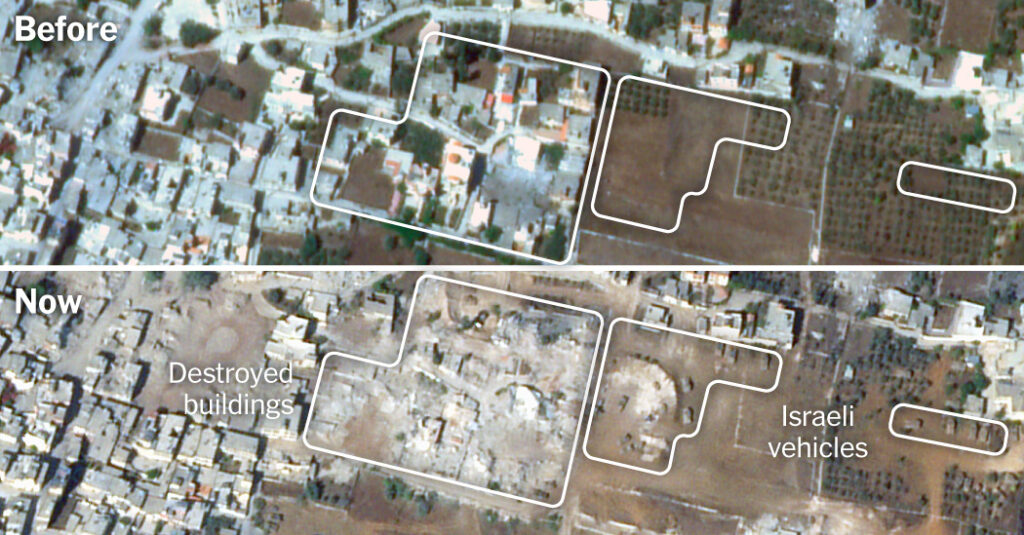The Lebanese village of Yaroun over the weekend.
A village abandoned and largely destroyed. Scores of homes leveled, a damaged health clinic and a centuries-old mosque now little more than rubble — toppled, a video suggests, in what appears to be a controlled explosion by the Israeli military.
These are some of the first glimpses to emerge from southern Lebanon, a week after Israel began its ground invasion there as part of its multipronged fight against Hezbollah. They can be seen in video and satellite images verified by The New York Times.
Source: Satellite image by Planet Labs, Oct. 5
Tank tracks leading from Israel across the border to the Lebanese village of Yaroun are visible in satellite images taken on Saturday by Planet Labs, a commercial satellite provider. So are newly constructed banks of earth where the Israeli military set up positions for tanks and other military vehicles.
Over the past week, the Israeli military has flattened large parts of two border villages: Maroun al-Ras and Yaroun, seen in the video above that was filmed by the Israeli military and verified by The Times.
Hezbollah has been launching rockets aimed at Israel from southern Lebanon since last October in solidarity with Hamas. Since then, both sides have been engaged in back and forth exchanges that have displaced tens of thousands of Lebanese and Israelis.
Israeli officials say the goal of the ground invasion in Lebanon is to destroy Hezbollah’s military infrastructure, which is closely embedded in villages near the border, and to return displaced Israeli villagers to their homes in the north.
Israel has scaled up its attacks on Hezbollah in recent days, sending ground forces into southern Lebanon from at least seven points and ordering Lebanese civilians to evacuate towns as far as 20 miles from the border. Hezbollah says it has targeted Israeli troops in both Maroun al-Ras and Yaroun with rocket barrages.
Sources: Israeli military, United Nations Interim Force in Lebanon, OpenStreetMap
Note: Crossing locations are based on a New York Times analysis of satellite imagery from Planet Labs.
By The New York Times
The fight is taking place as Israeli forces battle Hamas militants across another border, in the Gaza Strip.
In southern Lebanon, videos and photographs show Israeli soldiers patrolling the streets and setting up positions alongside homes. One video showed soldiers raising the Israeli flag over a destroyed park in Maroun al-Ras.
Both Maroun al-Ras and Yaroun were empty of residents before the Israeli military started its ground offensive, according to local officials. The mayor of Yaroun, Ali Qassem Tafeh, and the village’s former mayor, Hassan Awada, said most residents left when the strikes began last year.
Even before the ground invasion, months of rocket strikes had damaged Yaroun, this satellite imagery from the summer shows.
But the new satellite imagery shows fresh destruction since the invasion, with a whole section of Yaroun flattened after Israeli military vehicles razed the area.
After a week of shelling, strikes and clearing, there are more visibly destroyed buildings than previously seen. Large areas of land also appear to have been burned.
Source: Satellite imagery by Planet Labs
Similar scenes of destruction, including newly leveled buildings and a razed area, can be seen in nearby Maroun al-Ras, where Israeli military vehicles were also visible.
Maroun al-Ras has seen fighting before: It was the scene of a major battle during Israel’s 2006 invasion of Lebanon. As in Yaroun, many buildings in the village had already been destroyed by Israeli strikes and shelling in the months before the latest ground invasion.
Satellite imagery shows significant clearing.
More buildings appeared newly destroyed, and a part of the village had been flattened. One area that was flattened had been a park featuring a mosque that was a replica of the revered Aqsa mosque in Jerusalem.
Source: Satellite imagery by Planet Labs
One Israeli military official, who spoke on condition of anonymity because of the sensitive military context, told The Times that the vast majority of demolitions were conducted to eliminate threats posed by Hezbollah. He said that weapons had been found inside houses and that southern villages had been used as “terror outposts.”
The Israeli military said on Tuesday that it had destroyed a combat compound at a residential building in Maroun al-Ras, posting photos of weapons and a rocket launcher it said had been found there.
In an interview, the United Nations special rapporteur on the right to adequate housing, Balakrishnan Rajagopal, criticized the scale of destruction as military “overreach.”
“Humanitarian law is clear,” he said. “Civilian objects, homes, cultural buildings are protected under the Geneva Conventions and the Hague Convention.”
Mr. Rajagopal said that although Hezbollah may have used homes or civilian spaces, Israel must show that the sites pose an ongoing military threat. “Hostilities are nowhere to be seen,” he said, “and instead we see Israeli forces doing controlled demolitions.”
One video shared on social media and verified by The Times shows what appears to be a controlled explosion that destroyed a mosque inside Yaroun.
That mosque was over 300 years old, Yaroun’s mayor, Mr. Tafeh said. “This is the main mosque where daily prayers are held, and where religious holidays and occasions are celebrated,” he said.
Two other mosques were recently destroyed in Maroun al-Ras, satellite images showed. Asked why the mosques were razed, the Israeli military official said he did not know.
Yaroun’s Catholic church was also destroyed, along with a local health clinic and a religious shrine revered by both Muslims and Christians, according to Hussein Jaafar, the deputy mayor.
Satellite images showed that a large section of the Catholic church’s roof had collapsed. Some of the damage was caused by Israeli shelling in November, according to Lebanon’s official National News Agency.
Source: Satellite imagery by Planet Labs
Despite the destruction, Yaroun’s mayor vowed that residents would return.
“This is the land of our ancestors,” Mr. Tafeh said. “We will not abandon it.”
https://www.nytimes.com/interactive/2024/10/09/world/middleeast/lebanon-destruction.html


